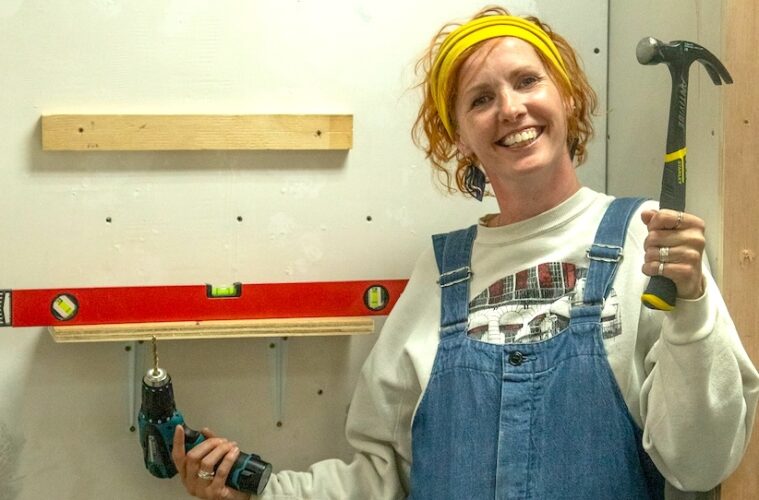Fancy learning a DIY skill? We catch up with Caroline Henn who leads the workshops at bePractical DIY helping women across the Bristol area to gain DIY and practical maintenance skills
Where did the idea for bePractical DIY come from?
I’ve been working in the trades for
years and many of my customers were women, a good few of which had had negative experiences when dealing with other tradespeople. My customer talked of feeling intimidated or exploited by tradesmen, and wanted to learn some practical skills, but didn’t know where to go. I found myself teaching people skills whilst I was working their homes.
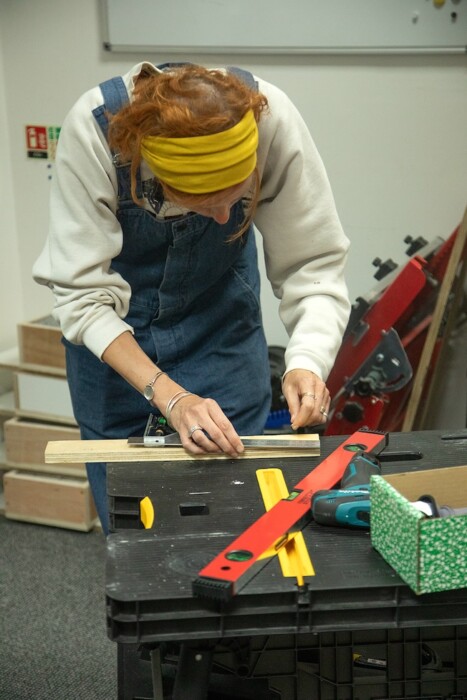
I was also keen to find a way to encourage more women to consider learning a trade. There are still far too few women working within the trades. Lack of visibility is not helping other women consider it as a career. If I can make myself more visible, and provide a safe supported place for women to start learning the skills they need, then I have done something to help make that change.
I also wanted to be able to provide training for people who wouldn’t normally be able to access these kinds of skills. If learning some practical skills meant that a woman experiencing domestic violence gained the confidence to leave a dangerous situation, or a foster care leaver felt a sense of empowerment when moving into accommodation on their own, then bePractical will have fulfilled an important need.
What is your background in DIY?
I first started doing DIY out of necessity when I bought my first home. I had no spare cash to pay anyone else, so I had to learn the skills myself. This was at the time of Changing Rooms, so I won’t go into some of the decorating travesties I left for the people who bought my home… Suffice it to say that stencils were involved.
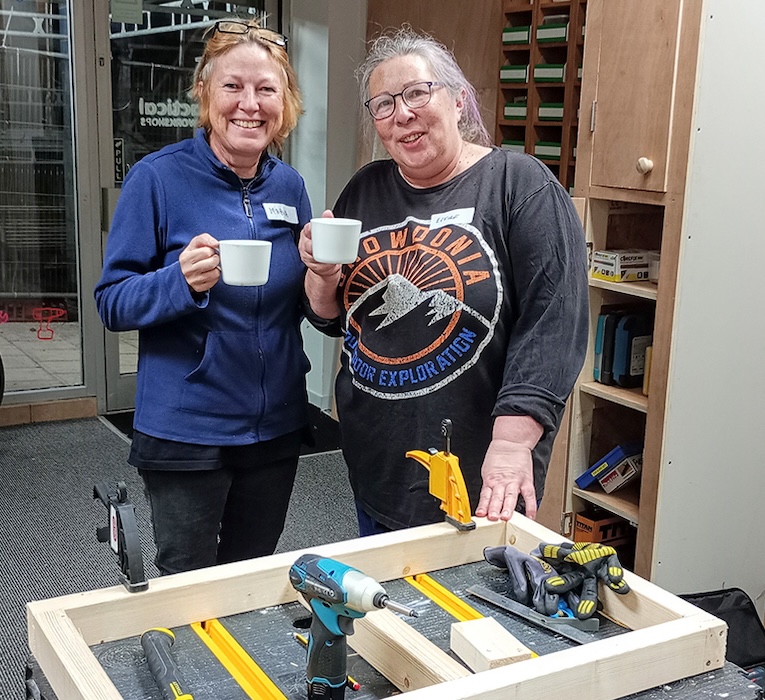
I then moved to run a smallholding in West Wales, where we converted a barn into Holiday Cottages. Again it was a matter of ‘needs must’. I learn a lot of building skills from the tradespeople helping us out with our conversion.
When I moved to Bristol in 2012, I decided that I loved this practical work so much, I wanted to make it my job. Over the following years I gained qualifications & experiences, as I set up my business, Practical Women.
Prior to Covid, we had a team of five women covering many trades skills, including electrics, plumbing and general maintenance, as well as kitchen and bathroom fitting. While, post Covid, the team has since dispersed to different parts of the UK, I am still keen to build a team of tradeswomen working with the Bristol, North Somerset & South Gloucestershire areas
Since Covid, I have concentrated my efforts on developing bePractical and my dream of teaching practical skills and empowering people.
What are the types of services that you provide?
At the moment I teach a range of courses including short Bitesize Courses, which last for two hours and and are aimed at people who just want to learn a specific ‘thing’, such as how to use a drill or a jigsaw, or to seal their bath and shower.
I also run longer half-day courses in beginners and more advanced DIY and plumbing skills.
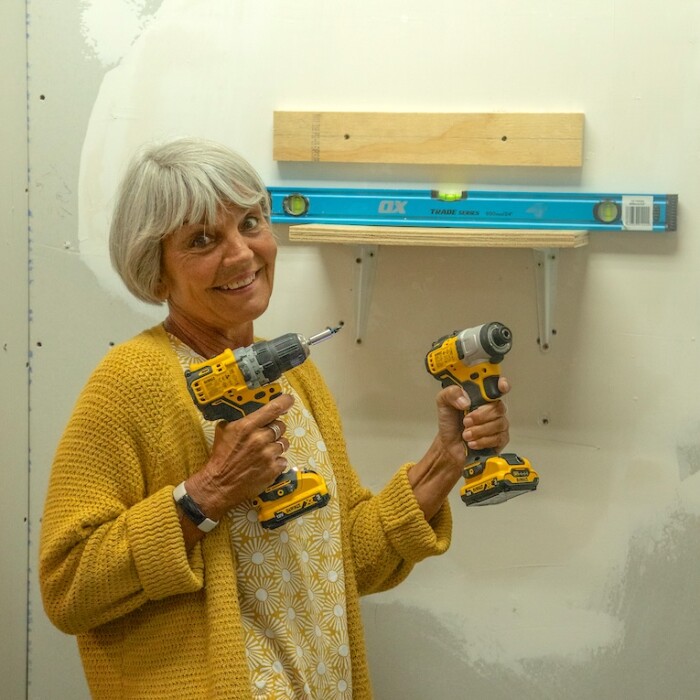
We have just started a series of two-week DIY carpentry courses, teaching people how to use a particular power tool, such as jigsaw or a circular saw. On these courses, they complete a project piece to take home with them.
Our DIY Clubs have been very popular. They run over four-week terms and cover a range of beginners and intermediate skills.
Currently I have a Women-only (Beginners) DIY Club, an Inclusive (Beginners) DIY Club and an Inclusive (Intermediate) DIY Club. They are really good fun – very relaxed and collaborative. I try to give a good grounding in a range of DIY skills.
We have a ‘show and tell’ at the beginning of each session, so that people can bring up issues that they have found at home and we can talk about and maybe even practice solutions for them.
I have recently started a DIY Assist Service, where I teach people in their own homes. We can work through their DIY jobs list together. I can help them decide the best order of events and teach different skills for each part of the project. I bring my tools, knowledge and problem-solving powers to empower people in their projects.
Sometimes this just needs a to be an hour-long video call, while we go through a particular things, while at other times we need a bit more time for the consultation which works better in their own home. We can go round the house together and chat about the issues. Sometimes they want me to be with them for a half day or even a whole day, while we work through a long list.
The idea isn’t that I do the work for them. They can pay a tradesperson to do that. DIY Assist is all about empowering people with the skills and knowledge to do the work themselves.
I offer ongoing support to anyone coming on one of our courses or DIY Clubs. I encourage people to call, email or WhatsApp me about issues. Together we try to find solutions. If people feel supported in their DIY projects, they are much more likely to find the confidence to have a go at them.
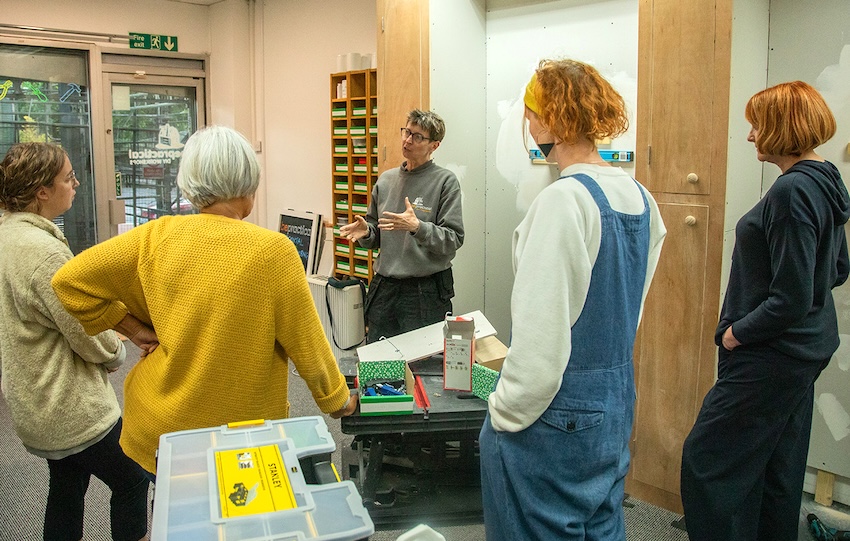
Who is the training aimed at?
The courses are for anyone interested in learning some DIY skills. Many of our courses are aimed at complete beginners, but we also cater for those who already have some DIY confidence.
At the moment, the majority of my customer are women. We do have some lovely men on the courses. Generally they feel that there is an expectation that they should know how to do DIY. There is still a lot of gender stereotyping in the world of practical skills. I really hope that bePractical DIY can change these attitudes.
I have recently had approval from my Insurance Company to start developing some courses aimed at children, so I’m hoping to develop some courses which can involve parents & carers and their children, and run them during school holidays.
What are the main challenges that are faced by the women coming to you for training?
For many women, lack of confidence is a major issue. This may be because they have been told by significant people in their lives that DIY is not for them. Several women have been told by men that women shouldn’t do DIY. It’s a man’s job. Where that comes from is beyond me…
Sometimes the tools have just been too heavy for them to feel comfortable using them. Lack of control has led to lack of confidence and fear of using power tools. For me, this is a really important issue. As a woman working in the trades, I have actively sought out tools that I feel comfortable using because they are manageable for me. As a result I have made sure that the tools I use to teach the classes are equally accessible to women.
On the Nailing it! course, I introduce cordless drills and impact drivers in the last hour of the session. Although many women are worried about using a drill, so far no one has left a course without feeling more confident about it. There are many lovely moments when people who have previously been really fearful, suddenly break into a huge grin and realise that their fears were completely unfounded. I wish I could bottle those moments. They’re priceless.
Can you provide an example of how the training has helped people who have attended the courses and workshops?
I can remember several women who had been recently widowed or split up with their partner. They had relied on their partners to carry out the practical work in the home. There were tools still in the house, but they didn’t know how to use them. They wished that they had learnt before.
Now they wanted to be independent and not have to rely on other people to carry out these DIY jobs for them. They came to bePractical to see if they could learn. They have gone away with the confidence to start tackling DIY jobs, and have often come back for more courses or joined a DIY Club to continue that journey.
Where does the training take place?
Most of the training takes place in our workshop in Brislington Village. We are on the Bath Road, but for the past two years have been hidden behind a huge scaffold tower, so are pretty much invisible. The workshop has two floors, with the top floor set up as a plumbing ‘play area’ where people can learn how to change taps, repair leaks, install traps and wastes, and the downstairs is the main DIY area, where we teach carpentry, power tools and general DIY skills. It’s a great space, plenty of room for learning.
Now that DIY Assist is getting off the ground, I’m also teaching more one-to-one in people’s homes, which is also lovely. I have to be a bit more organised in anticipating everything that I might need.
What do you enjoy most about offering these workshops and courses?
I love seeing the sense of empowerment in people who leave the courses. After my Nailing-it Beginners DIY Course, there is always a sense of determination. People talk about going home to find the drill which has been languishing in a cupboard for years and getting on with a project they’ve been too scared to start.
The Beginners Plumbing courses are great. Many people come because they don’t understand how plumbing works in their home. They leave with a much greater knowledge and understanding, and lots of practical experience of using plumbing fittings. They are better equipped to speak to tradespeople about what they want, and know what to ask for when lumbing work is carried out.
I encourage them to go home and carry out a plumbing audit of their homes. This enables them to identify any potential expensive issues. They can then speak to a plumber to get them fixed or even sort out the more straightforward ones themselves.
Find out more about bePractical DIY and book on to a course or workshop at bepractical.co.uk


